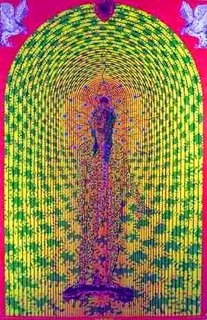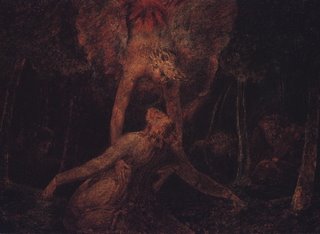Paint it Red

“From this point of view…it is as if everyone who was born after the 1960’s actually in some way lived through the 1960’s. They bear within themselves the effects of that era; they know its conflicts and struggles, its truths and revelations. In some sense this knowledge lives subconsciously within them…So too do we all, with respect to the preceding centuries of alignment and human experience.”
Richard Tarnas from ‘A Larger View of the Sixties’ in Cosmos and Psyche (2006: Viking Penguin.)
The point of view that Tarnas is referring to could be loosely summarized as the Archetypal perspective (an imaginal leap beyond the clinical perspective) in which the Imagination is given predominance as an inevitable precursor of true vision, understanding or gnosis. The Archetypal perspective dominates the content of this site: the four authors that have so far contributed were all born between 1970 and 1972. All were born at the death of the 1960’s and all, in their own way, have attempted to directly engage this legacy whether through Psychedelic music, Situationism, Environmentalism, Eastern Mysticism or LSD.
Tarnas in his voluminous study of culture follows larger planetary alignments of a collective nature in order to show an archetypal resonance between such alignments and history (the collective memory of humanity). He notes the results of such influences in primarily two forms: synchronistic activity whereby within one time period a number of different figures begin to access information and formulate certain thematically linked ideas and diachronic activity whereby one period in history revisits the issues (resolved and unresolved) of a prior period of history in which similar collective signatures and themes were found. Tarnas links the Pluto-Uranus conjunction of 1960-72 with a number of pivotal revolutionary periods in within the last four hundred years in which he explores prior meetings between these planetary influences. What he is unable to do with the conjunction of 1960-72 is to play it forward into further aspects of the cycle for this cycle has not played out yet…
How this revolutionary, inspirational, Dionysian and rebellious energy plays out is in the hands, hearts, minds and genitals of those alive now. Those for whom the Rubedo could become an embodied reality…For we are brothers and sisters in blood and could we but take the knife to our own hands and offer them in fellowship…in such a world there would be a much more serious pause before violence toward one of our own would be considered…As any of the true hippies knew…As I knew as a child of the Uranus-Pluto conjunction that over lit the sixties…as I had writ in large Day-Glo handwriting from above as Uranus moved to transit its natal position in my early twenties and the six tabs kicked in…We are all part of the one life, in soul, in blood, all a part of the origins…all bathed in a river of white love, purified and ready to redden into life again.
The true hippies did not become punks then yuppies, whatever. Whilst there is much to learn from in the fiery d.i.y. philosophy of punk and who would complain if they had a little more cash…? The true hippie simply went underground and dug deeper, living a life counter to the mainstream and its tendency to objectify the truth of another being, as if they are not like us, never mind that in the realization of the one truth they are same, they are us…
The true hippie will sing along with Blake as he takes the wedding pics for Heaven and Hell;
“Energy is the only life and is from the Body
and Reason is the bound or outward circumference of energy
Energy is eternal delight”
From ‘The Voice of the Devil’ in The Marriage of Heaven and Hell (1994:
I respect the true hippie – I sing for the true hippies…for Blake and Whitman…for Ram Dass and Jeffrey Wolf Green…for Martin Luther King and Carl Jung…for my closest friends…
Mark JonesIMAGES: Fool on the Hill by Wilfred Satty (1967), The Agony in the Garden by William Blake (c.1799)




0 Comments:
Post a Comment
<< Home